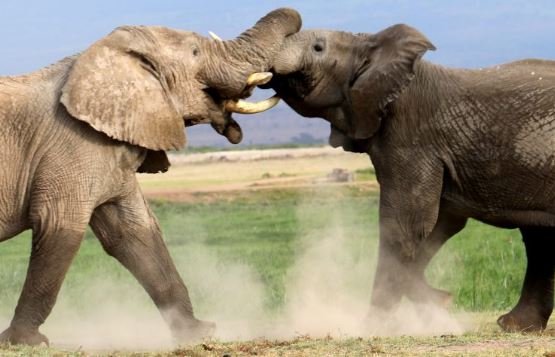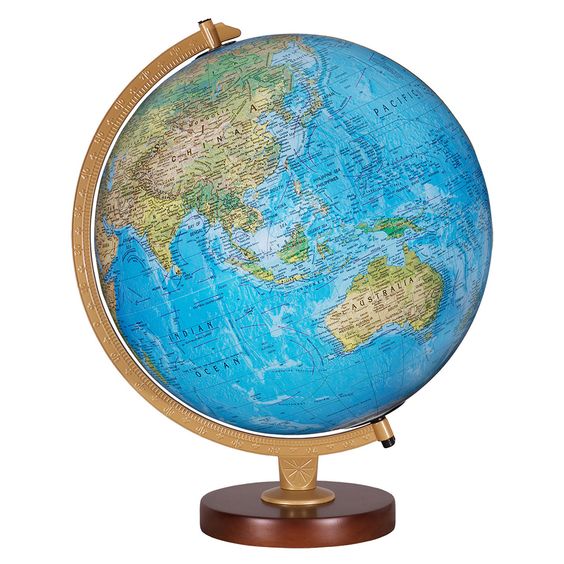
At the moment, the ancient adage is particularly apt. The war in Ukraine is creating an energy and food crisis, combined with the effects of climate change, recession etc. The world is in the thick of a perfect political and economic storm of global proportions.
By Tom Arms
When the elephants fight it is the grass that suffers. So goes the ancient proverb of Kenya’s Kikuyu tribe. And at the moment, the adage is particularly apt.
The war in Ukraine is creating an energy and food crisis. This is combined with the effects of climate change, recession and the continuing effects of the Covid pandemic. The world is in the thick of a perfect political and economic storm of global proportions.
Within the developed world, allies are starting to bicker as rich countries use their buying power to outbid their less well-off neighbors in order to hoard dwindling resources.
Money allocated for the welfare of people at home and abroad has been redirected to pay for the wasteful costs of war. $350 billion has been set aside for rebuilding ravaged Ukraine.
Meanwhile drought, famine and war are ravaging the Horn of Africa. In Kenya the UN reports that 4 million people are “food insecure.” In Ethiopia the fifth drought season in succession is exacerbated by a civil war. And in Somalia Islamic fundamentalists and drought are estimated by the UN High Commissioner for Refugees to have displaced 6 million people.
On the other side of Africa, desertification in Mali, Niger and northern Nigeria is forcing farmers off the land and providing fertile recruiting conditions for Boko Haram. Nigeria is also suffering from recent floods which destroyed 175,000 acres of farmland and displaced 1.4 million people.
Africa is not the only continent to suffer. It will take Pakistan years to recover from its recent floods. A quarter of the farmland was lost in a country where a quarter of the country’s national income is dependent on the agricultural industry. The total damage will exceed $40 billion or about one-sixth of the country’s GDP.
In the meantime, Western countries are borrowing heavily to finance subsidizing energy price. This is on top of record borrowing related to the Covid pandemic. The World Bank and IMF have declared their financial policies “unsustainable.”
Britain and Sweden—two of the leading lights in the foreign aid business—have significantly cut their aid budgets in response to increased pressure on their welfare budgets. Germany and Italy are expected to follow suit in the coming weeks.
Two developed countries have increased their aid budgets. Norway and Spain. Norway can afford it. Their $1.9 trillion oil-fuelled sovereign wealth fund provides each Norwegian with $250,000. But their $4.7 billion aid budget fails to make up for the roughly $20 billion lost from the British and Swedish cutbacks.
Of course the world’s biggest aid donor is the world’s biggest economy—the United States, although the roughly $40 billion it allocated this year is only a small proportion of its GDP. In fact, the US is near the bottom of OECD countries in terms of aid as a proportion of national GDP.
The Biden Administration hopes to take steps towards correcting this position by increasing the aid budget to $60 billion. But this is likely to be blocked if the Republicans win the mid-term elections.
China does not publish its aid budget. It has, however, become a significant donor on the world stage, although a lot of its financial support is in the form of loans for infrastructure projects. This is starting to create worries about a Chinese-fuelled debt crisis similarly to the one the West faced in the 1980s and 1990s.
Repayments on Chinese loans for the development of Hambartota International Port and Mattala Rakapaksa International Airport contributed to the riots and collapse of the Sri Lankan government. Thirty percent of Pakistan’s foreign debt is owed to Beijing.
In Africa, Angola, Ethiopia, Djibouti, Kenya, Nigeria and Zambia are heavily indebted to Chinese bankers. Recently there were fears that Kenya was on the verge of defaulting on its debt to Beijing because of difficulties in financing a Chinese loan to build a $4 billion railway.
A few years ago much ado was made about Xi Jinping’s pledge to invest $60 billion in Africa. Then last December he announced that the investment was being reduced to $40 billion because of Covid, and at the recent Chinese Party Congress there were hints that the slowdown in the Chinese economy meant that the Chinese aid budget and loan terms would need to be “reviewed.”
Aid is not pure philanthropy. In the quarter of a century before the pandemic the number of people judged by the UN to be in extreme poverty fell to 750 million—ten percent of the world’s population. These slightly wealthier people had more cash to spend on goods from developed countries. They were also more likely to stay at home instead of becoming economic migrants and their governments were more stable. This was a major benefit for the developed world whose economies also saw major growth.
Now the developing world is going into reverse. Over the past 15 years Ethiopia enjoyed an average growth of 9.5 percent a year. It is now heading towards recession. According to the IMF the world economy has more than halved from six percent growth in 2021 to a prediction of 2.7 percent in 2023.
Of course, that is not to say that money has disappeared. There are more than 2,200 billionaires in the world. The richest of them, Elon Musk, just spent $44 billion to buy Twitter. He is worth $220 billion.
 World Review
World Review
- We will probably never know the reason for the removal of Hu Jintao from the recent Chinese People’s Party Congress. Was it the result of the medical problems of a confused old man? Or was it a crude attempt by Xi Jinping to emphasize that he is now totally in charge? 79-year-old Hu was Xi’s immediate predecessor. His administration was known for corruption, market reforms and greater political freedom; all of which are being suppressed by Xi. There must have been some discomfort among the party grandees about Xi amending the constitution to allow himself to serve a third (and probably fourth, fifth…) term as party leader and president. Publicly humiliating Xi could have been his way of warning off potential critics. There aren’t many left in the upper reaches of the Chinese Communist Party. Xi has used the party congress to eliminate rivals and confirm acolytes. Good for Xi but bad for the world. Having the world’s most powerful dictator surrounded by Yes Men is not good news.
- The Franco-German Alliance has been at the heart of peace in Europe since 1962 when Konrad Adenauer and Charles de Gaulle buried a century of brutal animosity in a service at Reims Cathedral. But what has been termed the “engine room of the EU” is now showing signs of stalling in the face of the energy crisis, the Ukraine War and relations with America. French President Emmanuel Macron is pushing for an EU-wide agreement to cap gas prices and share resources. Such a move was approved in principle at a recent EU summit but Germany’s Olof Scholz is dragging German feet on agreeing the details. At the same time, the Germans have been using their buying power to secure gas supplies at the expense of less well-off EU members. So far the Germans have filled about 90 percent of their storage capacity while countries such as Poland, Slovakia and the Czech Republic are struggling. There are also differences over defense and how military and economic aid should be directed towards Ukraine. The Germans are keen to use Ukraine to tie Washington closer to the defense of Europe. France sees the war as an opportunity to increase European defense cooperation and are angry at the Germans’ cancellation of Franco-German projects involving a new generation of fighter aircraft and battle tanks. Scholz and Macron were keen to smile for the cameras and minimize their differences at their most recent meeting, but they also postponed a 26 October regular Franco-German ministerial conference until “sometime in January.”
- Some pundits are beginning to worry about the impact the US mid-term elections may have on continued American support for Ukraine. At the moment it is looking as if the Republicans may gain control of both the Senate and the House of Representatives, and there is a growing isolationist wing on the right of the Republican Party. For instance, if the Republicans win control of the lower chamber, Kevin McCarthy will become Speaker of the House and control the legislative agenda. He recently went on record to say that Americans “are not going to be inclined to write a blank cheque to Ukraine.” Josh Hawley, the senator from Missouri and a wannabe far-right standard bearer, went further and said that American aid to Ukraine “allows Europe to freeload.” US aid Kyiv is substantial. At $52 billion it is twice as much as all the other NATO contributors combined. Especially helpful to the Ukrainian military have been America’s High Mobility Artillery Rocket Systems (HIMARS). But not all Republicans want to back away from Ukraine. Their leader in the Senate, Mitch McConnell, is foursquare behind Volodomyr Zelensky and President Biden’s Ukraine policy. Opinion polls also show 73 percent of the voters supporting Ukraine. But that figure is down five percent from three months ago.
- This past Thursday (27 October) saw 40 days since 22-year-old Mahsa Amin died in Iranian police custody after being arrested for being “improperly dressed.” In the Shia religion the 40th day after a death is when families and friends gather for the equivalent of an Islamic memorial service. In Iran this week they chose to mark the day with increased rioting. There is now a real possibility that angry rampaging women could topple Iran’s theocratic dictatorship. Previous demonstrations have been about elections, prices or living conditions. Current disturbances are more basic. “Death to the Dictator,” is the cry being increasingly shouted on the streets of Tehran, Esfahan, Bushehr, Arak….Another feature of past demonstrations/riots was the ability of the regime to urge their supporters to launch counter-demonstrations. Counter-demonstrations have been inconspicuous by their absence. This could be a sign that 83-year-old Ayatollah Khameini is losing support among senior clerics. But opponents should be wary of celebrations. Not only could they be premature but there is the danger of what follows. In 1979 there was a recognized alternative to the Shah. The current revolution is leaderless. That means there is a real threat of a political vacuum if Iran’s mullahs are violently toppled. Political vacuums are fraught with unknown dangers.
- Anyone who thinks that Boris Johnson “Got Brexit Done” should cast their eye across the Irish Sea to Northern Ireland. Because of Johnson’s cack-handed handling of the troubled province’s relationship with the EU, Northern Ireland has failed to form a government and is facing yet another election to its devolved Stormont Assembly. All of this is damaging the Good Friday Agreement, essential services in Northern Ireland, the local economy, threatening a wider, nasty EU-UK Trade War and endangering US-UK relations. At the heart of the issue is that the largest Northern Irish Party, Sinn Fein, wants Northern Ireland economically tied to the EU because it knows it will speed up eventual political unification with the southern half of the island. The Democratic Unionist Party (DUP), on the other hand wants to break with the EU and tighten economic ties with mainland Britain for the exact opposite reason. The Northern Ireland Protocol negotiated by Johnson favors Sinn Fein and the DUP are refusing to form a power-sharing government (as stipulated by the Good Friday Agreement) until the Northern Ireland Protocol is ditched. Meanwhile the EU is threatening a trade war with the UK if the protocol is scrapped. The Biden Administration is angry because Washington is co-guarantor to the Good Friday Agreement. It seems that Johnson’s “oven-ready” deal is not even “half-baked.”
____________________
 Tom Arms is foreign editor of Liberal Democrat Voice and author of the recently published book “America Made in Britain.”
Tom Arms is foreign editor of Liberal Democrat Voice and author of the recently published book “America Made in Britain.”